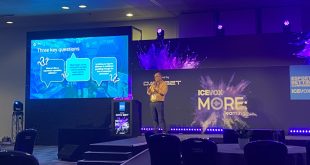At the inaugural SBC Safer Gambling Forum, which took place at the CasinoBeats Summit in September, industry leaders came together to discuss some of the most pressing responsible gambling topics at the minute.
During Responsible Gambling Week (RGWeek 2019), which runs until 13 November, SBC will look at some of the topics addressed during the forum, and what measures the industry can take to promote responsible gaming.
Moderating a panel focused on ‘Corporate Social Responsibility (CSR) – the key to sustainable gaming’, David Flynn, CEO of Swintt, addressed the topics of discussion that would be touched on by the panel before providing a brief background on his industry career and touching on how CSR and responsible gaming are important to him.
Speaking on the panel was the Director of Digital at The Health Lottery Yakir Firestane, CEO of Microgaming John Coleman, Co-Founder of Green Jade Games Jasper Kӓrrbrink, Founder & Chief Executive at YGAM Lee Willows and Former CEO of Sky Betting & Gaming Richard Flint.
Flynn briefly discussed the iGaming industry, citing the H2GC report which projects €64bn to be delivered in 2024, before kicking off the panel discussion by opening up to Kӓrrbrink who gave his opinions on CSR.
The co-founder of Green Jade Games stated: “The gaming industry is so consumed with responsible gaming and a lot of people in the gaming industry see responsible gaming as CSR and in my opinion that is wrong. Responsible gaming is something that we should do anyways, its part of the business it should be more seen as a hygiene factor and its actually a pretty smart business decision.
“To take responsible gaming carefully is not CSR. CSR is something you do outside the business, something where you use your momentum and the power you have in your company to do something good like cleaning the ocean as we did – We had a boat shipped with its captain and staff picking hundred of kilos of plastic everyday. For me that’s CSR.
“When I speak to a lot of colleagues in this industry they say ‘we don’t do CSR because it’s going to come back and bite us in the back’ because they have not yet done the hygiene factor. I think that’s one of the things that hinders this industry, to take the leap it should which also means its much more important for the operators and providers that are doing the right thing to actually take the next step and do CSR initiatives because as an industry, it’s embarrassing how little we spend on this with the money we make
In response to Kӓrrbrink’s personal definition of CSR, Flint provided an element of debate to the panel with his response: “I like to be controversial. I think what has been said about doing stuff that is unrelated to gaming and that has a broader social purpose is obviously a big part of CSR and is really important not least to get back the debate and to recruit people etc.
“But, I do think there is potentially a risk that if we don’t focus on doing the right thing, which will involve turning away certain revenues in our core business which is gambling, then all this stuff will be seen as trying to wash the story and an irrelevance to try and distract people from what many think is a fundamentally damaging activity.
“So, I think there’s two parts to it. There’s the sort of doing broader good things but also there has to be, maybe as a hygiene factor although I don’t think it is for everyone, a focus on running our day-to-day business which is gambling in some shape or form in a way that provides the most enjoyment without harming people.”
In response to the comments made by his fellow panelists, Coleman added a providers perspective on the topic as he walked the panel through some of the initiatives he is involved in: “I think at a public perception the industry needs to do a lot more, but, I think it’s wrong to say the industry isn’t involving itself in CSR initiatives. I do think there are a lot of businesses who do noble CSR initiative.
“The type of things we have evolved probably predates most of the companies that sit outside. It started as that intent to give back, it genuinely did. I joined the business in 2004 and for a number of years we were generous and we will continue to be generous at quite substantial levels. I’m not sure if that sets us apart but it’s something we have done consciously. That evolved into ‘Microgaming play it forward’ and we combined everything that we did into this one initiative in 2014. Now we support areas such as education, charities, the environment and we have a cultural ambassador etc.
“We go across the environment in terms of our support so the type of things which I think is core to our business and what’s changed it is that we embedded it at a cultural level. We made the mistake initially that whether I wanted to support a charity because I liked it didn’t necessarily mean that our staff got it. What changed for me was when suddenly we pushed the power to our staff and now they are intimately involved in the CSR initiative.
“As a business, who drives our CSR initiative is our staff. I promise you the staff that you will be bringing in nowadays, CSR is important to them. They will not join our business unless we/they feel responsible. Coming from staff initiative, we in the business give everybody a daily lunch allowance which is reasonably generous but we are finding is the behaviour of staff. Let’s say they had 50p change, they were going buying chocolate. We put the question to them to not spend the change and to give it to charity – it changed their perspective and now through that initiative we’ve raised over £90,000 of additional money and now the staff vote and nominate the charity. That to my mind is culturally embedding CSR within the business.”
Keeping on the topic of charitable donations, Firestane added: “I think that it’s not only running our business in a way that doesn’t harm people its running our business with having the ability to do something good built into the business model. So, not running the business in such a way that you dont do bad is ok, but CSR is probably running your business in such a way that you actually do good. That’s how I would put it.
“Obviously as a lottery it is baked into our license. The interesting thing is that we are slightly venturing outside of lottery, so we’ve sublicensed our brand to launch a casino, and we’ve chosen to continue supporting health-related charities from the profits of our casino and that actually proved to be a good business decision because it allows us to diversify – it gives us a USP, it reduces our CPA’s it helps us do good business.
“When the Health Lottery was setup we setup one single charity that gets all the money we raise and their job is to find projects to fund. Now the Health Lottery, me the person who is selling the tickets, we have absolutely no influence with what they do with the money and then that gives them the freedom of choice and the freedom of decision to go and find really small grassroots projects that are interesting.
I think that is actually a very interesting model because let’s be honest with ourselves, Cancer UK doesn’t need our money, they have enough. But there are many small vulnerable charities, projects and initiatives that do. It’s harder to find them but if we truly are in this to do good then we don’t really need that brand.”
Regarding CSR, willows agreed that it was completely different when compared to responsible gambling. He viewed it as a tool that can be used to win the hearts and minds of customers as well as a catalyst to reverse the negative press associated within the industry.
He provided a charities perspective on CSR, concluding: “I think the media story around responsible gambling is owned by quite a negative press, certainly in the UK, there’s a lot of untruths spoken in parliament and I think CSR can potentially be a catalyst to get the story back as well as to drive profits and attracting the best talent to come work for you.
“There is a real strong perceived influence that if as charities we work directly with the industry somehow we’re in the industry palms, but it couldn’t be further away from the truth. Certainly for us and other charities in the room, we’ve got an independent board from a governors point of view we can evidence that and I think we actually as charities need to do a bit of work to get that message out and work with operators to get over that hurdle of being in the industries pockets.”








